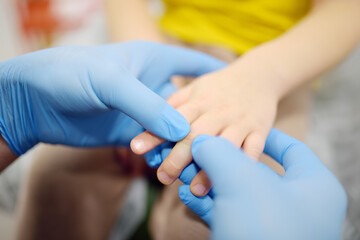As a pediatrician at ONP Hospitals, I’ve witnessed countless stories of resilience and recovery, but one case stands out—little Anaya’s story. Anaya, a spirited four-year-old, came to us after a severe finger injury that happened while she was playing in the backyard....
Latest 7 Techniques to Improve IVF Success Rates

It is true that In Vitro Fertilization fulfills the dreams of millions of parents each year — and yet it still has the potential for development. Without any doubt, IVF is the most successful technique of treating infertility. The success rate of IVF has improved over the past 10 to 20 years.
In rare cases, assisted reproduction may not provide the desired outcomes. IVF success rates can be increased by following these techniques:
Don’t Expose Yourself to Toxic Substances
An IVF patient must, in general, stay away from all toxic and dangerous substances that might interfere with the process. Hence, it is best to avoid pesticides, fertilizers, detergents, and other potentially harmful chemicals altogether.
Maintain a Balanced Diet
Many nutrients can naturally thicken the uterine wall, making it more certain that a pregnancy will also occur as a result of this. Eating a healthy diet, say—doctors—is another method to enhance your chances of getting pregnant following IVF.
Choosing the Right Sperm
A good selection of sperm according to the kind of in vitro fertilization is essential to increasing the odds of getting pregnant following IVF.
Acupuncture
To prepare for childbirth, ease minor pregnancy discomforts, and decrease weight after childbirth, pregnant women and young moms are commonly encouraged to undergo acupuncture. In vitro fertilization, success rates have been proven to increase as well, according to many studies.
Proper Sleep
For at least two weeks before your In Vitro Fertilization treatment, your sleep cycle should be regular. Spend eight hours a day sleeping. Melatonin levels in the body are regulated when you sleep in complete darkness, which improves your physical and mental health.
Increase Sperm Count by Avoiding Ejaculation
It is recommended that the male spouse refrains from ejaculating for three to four days before the donation of sperm. In addition, refraining from the sexual activity will improve the sperm count, increasing the chances of IVF success. Pre-testing of the sperm is also crucial since its quality might alter over time.
Choosing the Best Moment to Perform IVF
In the hands of a competent fertility team, they can identify the ideal timing to perform IVF on you. A detailed analysis of oocyte maturation will be carried out to determine when IVF can take place.
When undergoing In Vitro Fertilization procedures, it is important to take good care of your physical and mental well-being. Getting pregnant depends on many personal circumstances, therefore the best suggestion is to contact a reputed assisted reproduction clinic and let the best specialists handle your case.
About Author
More Blogs
Addressing Childhood Obesity: Preventative Measures and Healthy Lifestyle Choices
Childhood obesity is growing concern. More kids...
Healthy Sleep Habits for Children: Tips for Parents
Good sleep is essential for children’s health...
The Role of Diet and Nutrition in Managing Encopresis in Children: Insights from Dr. Amita Phadnis
Encopresis, a condition characterized by...
More Videos
Dr. Amita Phadnis’s Full Speech on Survival & Health Rights at UNICEF India.
Dr. Amita Phadnis ,M.D., Gave a Motivating Speech
Breast cancer is cancer that forms in breast cells. Women are mostly diagnosed with this cancer. Although it can be seen in both men and women
What is AMH
The granulosa cells in your ovarian follicles create the anti-Mullerian hormone, often known as AMH. According to the American College of Obstetricians and Gynecologists (ACOG), the generation of AMH is a reflection of your ovarian reserve.
FAQ’S
Pregnancy and Migraine Headaches: What Women Need to Know
When you are pregnant or breastfeeding, then...
What Is the Problem of Orthopedics in Children?
While orthopaedic problems are commonly seen in and associated with the elderly, it’s important to be alert regarding the fact that they can afflict young people and children as well.
All You Need to Know About Reproduction
Most science students have to study about reproduction in their high school syllabus, and some learn from their parents, who may discuss it even earlier. It’s a very good thing to know about our own bodies…




 Home
Home Blogs
Blogs



